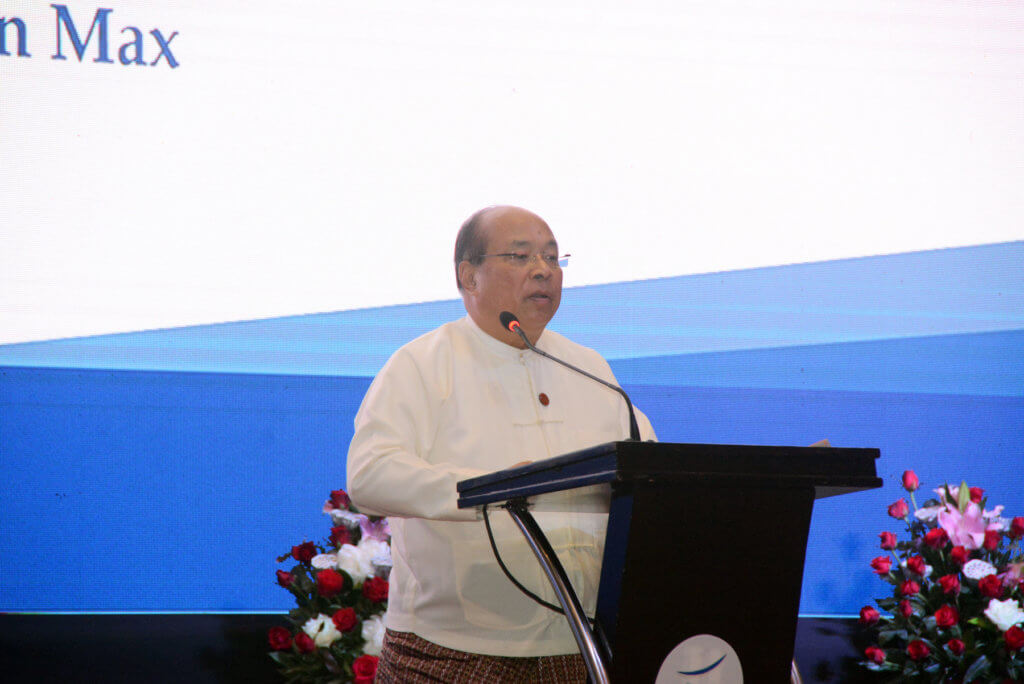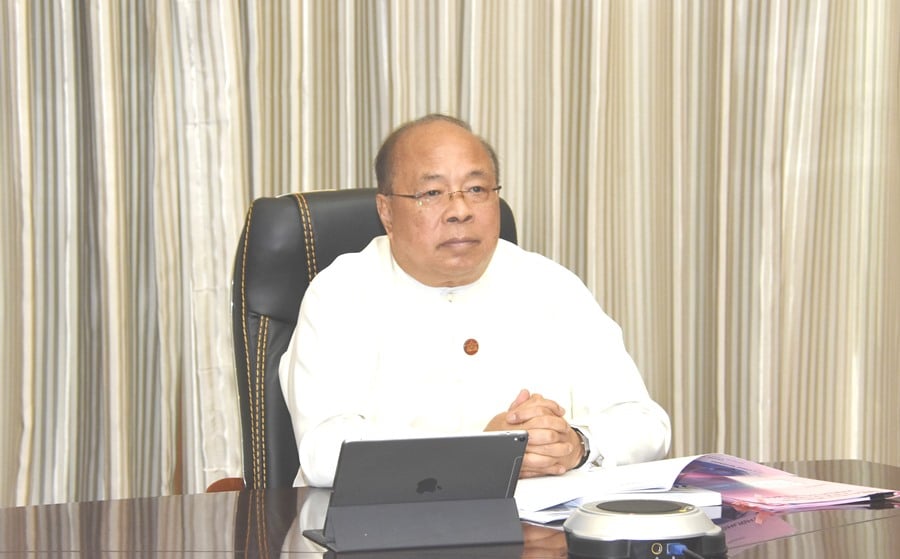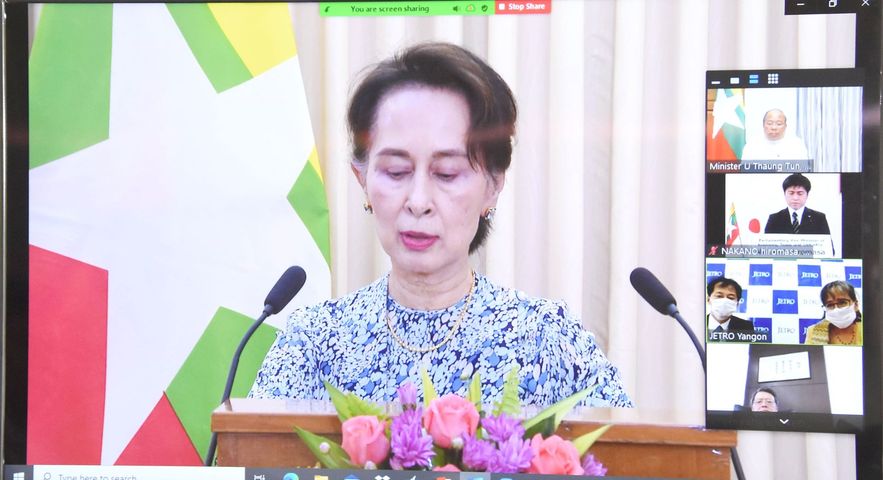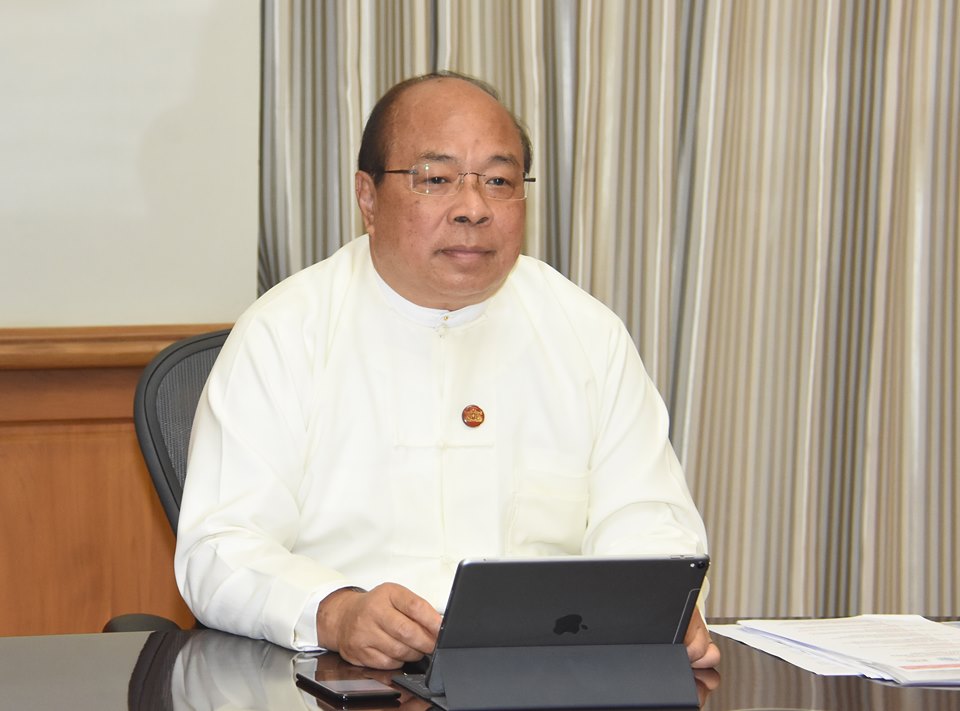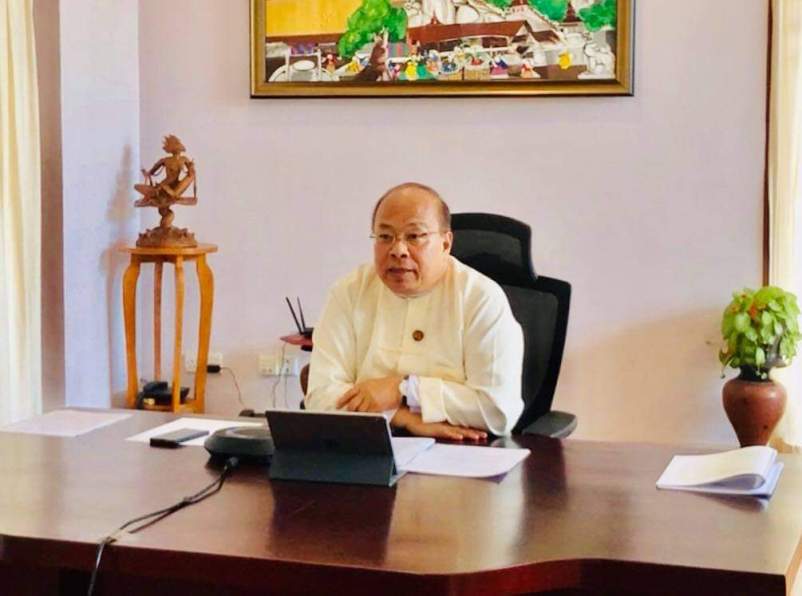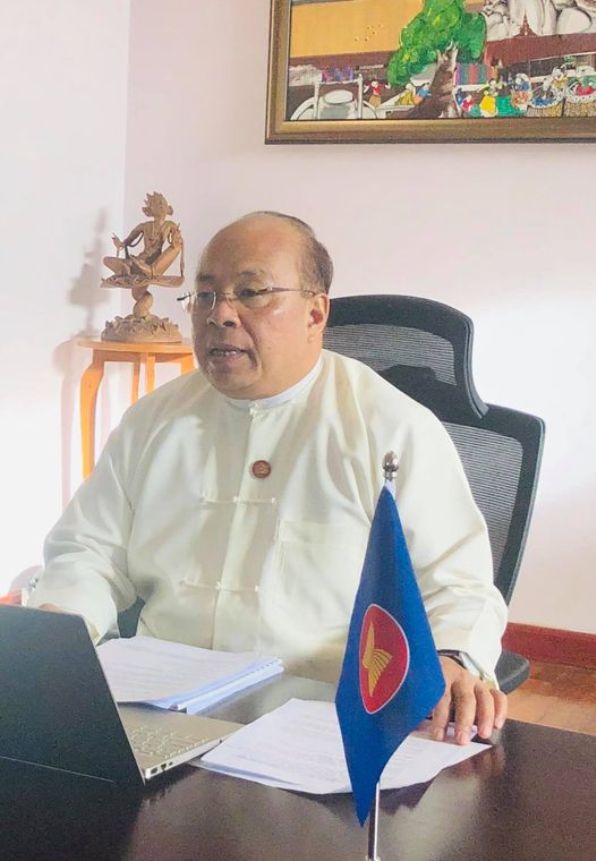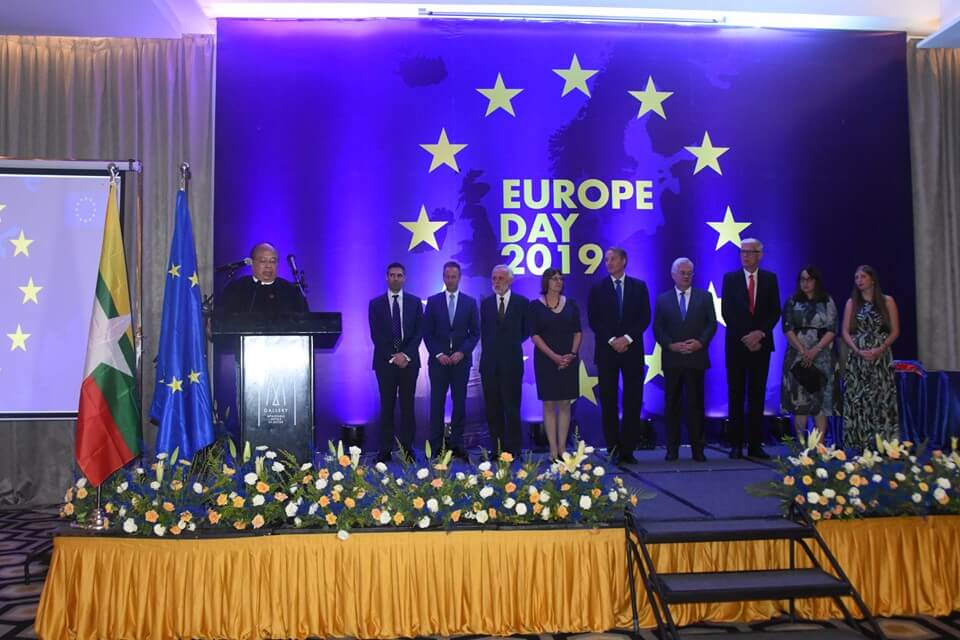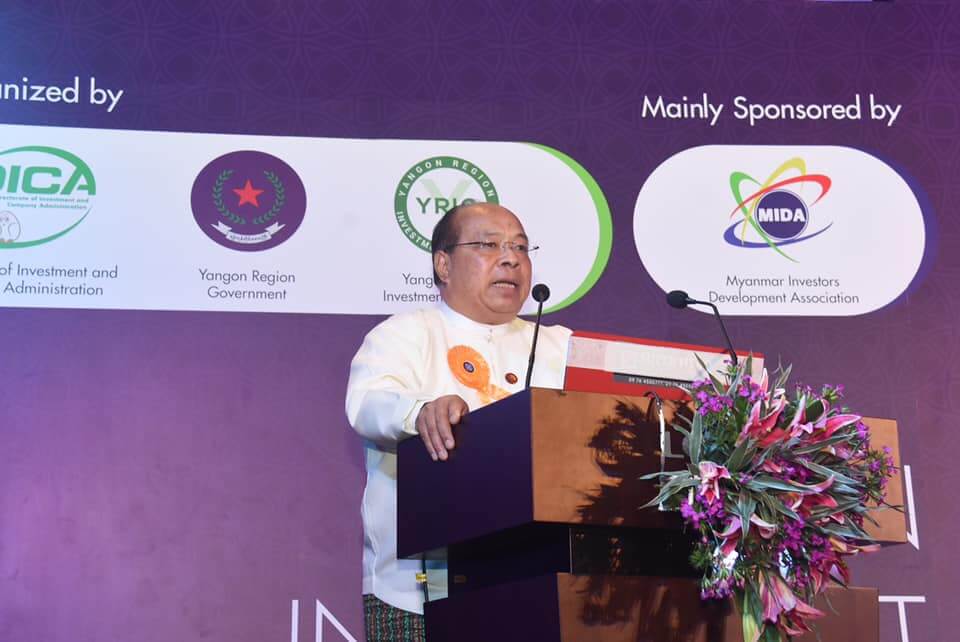20 August 20
Novotel Hotel, Yangon
Your Excellency Scot Marciel, U.S. Ambassador to Myanmar,
Your Excellency Ichiro Maruyama, Ambassador of Japan to Myanmar,
Distinguished Representatives of the Chambers of Commerce and Industry present here today;
Ladies and Gentlemen,
I’d like to begin by expressing my thanks and appreciation to:
• The Chair of the Japan Chamber of Commerce and Industry in Myanmar,
• The President of the American Chamber of Commerce in Myanmar,
• the Japan External Trade Organisation,
• the Japan International Cooperation Agency,
• the US Commercial Service and,
• the Directorate for Investment and Company Administration, and the Myanmar Investment Commission.
Thank you all for your role in arranging this important Forum.
Ladies and Gentlemen:
Before I begin, I would like to direct our attention, and indeed, our compassion, toward those recovering from the incessant rains which battered Myanmar recently and which, as we all know, triggered a tragic landslide in Paung Township.
While Mon State is the worst-hit, the people of Bago Region, Kayin State and Sagaing Region have also been severely affected.
Our Department of Disaster Management is working closely with local authorities and first responders, including our security and fire services, the military, local community groups, the Myanmar Red Cross, monasteries and other faith groups - and of course, with the private sector to provide immediate and longer-term assistance.
I know that many of you have been fortunate to spend time with communities who are now beginning their recovery process.
I would simply ask that where possible, you might consider supporting these recovery efforts either through existing CSR programmes, or through any other avenue deemed appropriate.
Excellencies, Distinguished Guests:
As I am sure you are aware, in November of 2018 the new Union Ministry of Investment and Foreign Economic Relations was created to help further enhance this government’s ability to ensure that foreign investment, and development financing more broadly, is best able to address the needs of our people, while promoting quality, responsible and sustainable economic development through enhanced cooperation with the international community.
I am pleased to say that we are already seeing sure signs of success!
Throughout the past nine months we have seen a raft of ambitious policy reforms which have facilitated new investments in infrastructure, services, transport, and manufacturing amongst many other sectors.
In part due to rising investor interest, from both a regional and global perspective, Myanmar is expected to continue experiencing robust economic growth, likely to top 6.8 per cent in 2020.
Commensurate with this growth, I am very pleased to report that DICA approved investments have now risen 79 per cent, totalling US$2.35 billion.
Encouragingly, investment from Singapore, where many Western and Japanese companies situate their regional investment operations, almost tripled to US$1.3 billion in the first half of 2019.
Chinese and Hong Kong investment in Myanmar has also grown some 150 per cent to US$590 million.
In terms of sectors, energy, transport, and infrastructure saw promising growth.
Investment into our manufacturing sector has risen some 60% to $700 million.
Investment in transportation and telecommunications have quadrupled to $1 billion.
We very much look forward to seeing positive spill-over effects made possible by these and other investments, and to the new job opportunities they will create.
Excellencies, Distinguished Guests:
In Myanmar we have a saying:
“A single sesame seed will not make oil.”
So, let me now take a brief moment to describe a few of these major reform initiatives that this government has pursued since coming into office.
None of the success we are seeing occurred by chance. Indeed, much of our shared success has been achieved despite challenging global and regional headwinds.
In 2016, we successfully passed the Myanmar Investment Law which sought to increase levels investment from both foreign and local partners.
Our new Investment Law greatly simplified rules and regulations and brought Myanmar into greater alignment with global standards.
But we did not stop there.
Shortly afterwards, in May of 2018, working together with the Ministry of Commerce, we were able to open up our wholesale and retail sector to direct foreign investment.
Subsequently, on the 1st of August last year, our new Companies Law came into effect – permitting investments in domestic companies of up to 35 per cent.
This new law also opened up our stock exchange to foreign participation – providing more streamlined business regulations, making it easier than ever to launch and operate new businesses, while providing the government with powers to enforce new corporate governance rules and regulations.
We’ve also launched our new, online company registration portal known as “MyCO”.
In addition to making the company registration process quick and efficient, MyCO also provides a searchable company registry that offers much greater corporate transparency.
I am sure that the new procedure will assist potential investors as they conduct due diligence and other research as they consider entering the Myanmar market.
As evidence of MyCO’s success, I am very pleased to announce that in the last month alone, DICA saw 1,428 new companies register successfully - 100 per cent of which opted to register online via MyCO.
In little more than a year we have seen the complete digitalization of the company registration process! I think this is remarkable progress – and it is progress like this that we are committed to learning from, adapting and expanding to other areas.
Then, in April of this year, the government awarded licenses to five international insurance firms to offer wholly-foreign-owned life insurance options.
I am very pleased to say that Dai-ichi Life from Japan, and Chubb from the US, were amongst those firms who were granted licenses.
This is a highly strategic sector for Myanmar with significant growth potential. According to one forecast made by Japan’s Dai-ichi Life, our insurance sector will expand nearly a hundred times over to $1.3 billion in the next ten years!
To help coordinate these reforms, together with a pipeline of upcoming reforms, as I noted earlier, the government created the Ministry for Foreign Investment and Economic Relations.
I am deeply honoured to serve this new Ministry as Minister.
The Ministry is fully committed to doing its part to ensure the successful implementation of both our Myanmar Sustainable Development Plan and the Myanmar Investment Promotion Plan.
Taken together, these strategic documents provide us with a unifying and coherent roadmap for all future reforms while reflecting Myanmar’s commitment to the 2030 Agenda and to doing our utmost to support the achievement of the Sustainable Development Goals.
Excellencies, Distinguished Guests:
As I have said, our shared success – and I stress, it is a shared success – has thus far has been the result of a series of well planned, well sequenced, reform initiatives – analogous perhaps to a performance of a traditional Myanmar "Hsaing waing" - loosely translated as a traditional Myanmar orchestra.
In a traditional Myanmar orchestra we have the pyissin turiya, or brass instruments, – the kyei, leather covered drums – the thayyei , string and wind instruments, the kyo and lei and so on.
If a conductor were to instruct the orchestra to play each instrument in isolation or even consecutively – one would never experience the beauty of the full ensemble. Delicate rhythms and melodies would be drowned out by a cacophony - “full of sound and fury, signifying nothing” to quote the great bard Shakespeare.
The same can be said of a country’s reform process, and in our particular case, the creation of an investment enabling environment.
Ladies and Gentlemen:
Over the past seven years Myanmar has undergone a largely peaceful transition from military dictatorship to a democratic, civilian-led government.
While many truly remarkable changes have occurred, like the State Counsellor noted, challenges do remain.
Recognising the immense value of foreign investment, it could be said that Myanmar is still in the early stages of our structural transformation – a process which, over time, will require the continued reallocation of economic activity from low to high productivity sectors.
“Success smiles upon those who anticipate changes in their operating environment, and not upon those who seek to adapt once changes have occurred.”
A vast majority of our domestic private sector is witnessing the rapid pace of change and adjusting their business models accordingly. Outdated conglomerates are now seeking to reform, albeit slowly.
Yet, while in Myanmar in 2019, ‘business as usual’ cannot be considered a recipe for success, to quote the famed Japanese author Miyamoto Musashi:
“…there is more than one path to the top of the mountain.”
In some aspects of Myanmar’s reform, the thousand-mile road must be walked step-by-step.
We welcome, and indeed, we prioritise economic ties and engagement with those foreign companies and businesses that can move with the times. Such relationships will strengthen our economy in ways that promote human rights in all forms, ensure the full consideration of potential negative social or economy impacts, and supports the continued economic expansion in accordance with liberal democratic norms and principles.
We are equally open to greater and deeper dialogue with you, investors and partners in development. Together, we look forward to adapting policies and approaches in ways that encourage positive incentives, manage risks and create shared value – both commercial and developmental benefits - for businesses and society alike.
Ladies and Gentlemen:
As I conclude my remarks, I do encourage both US and Japanese investors to search for partnerships within our expanding agriculture sector.
This includes investing in the construction of durable, climate resilient transport infrastructure, and bringing farmers closer to markets.
I also encourage you to identify ‘investment synergies’ which will contribute to the of strengthening our nation’s economic fundamentals – infrastructure financing, labour, procurement, banking etc.
To our friends from the US, we strongly encourage you to consider channelling greater investment into our Special Economic Zones such as Thilawa.
We’ve have noted that these SEZs tend to attract more technologically sophisticated firms and are playing an increasingly important role in fostering skills and knowledge transfer throughout the rest of the economy.
Finally, we in Nay Pyi Taw welcome closer working relationships with you all, especially where these relationships can encourage greater investment, boost productivity, and help to speed up our nation’s expansion of manufacturing activity.
The ideas I share today have implications far beyond our efforts to attract foreign investment.
Indeed, I believe they will help to further cement Myanmar’s shift towards an open, market-based economy and ensure that democracy takes firm root in the country.
Excellencies, Distinguished Guests:
As a new wave of investment-oriented reform bears fruit, more Japanese and US companies have shown growing interest in investing in Myanmar. We warmly welcome you.
The Directorate for Investment and Company Administration, our investment promotion agency, is also here to assist – providing information, fostering coordination and identifying new opportunities in Myanmar.
I look forward to meeting with you and and our broader development partner community again during our next Development Effectiveness Roundtable scheduled to take place in December of this year.
In the meantime, do come and experience Myanmar’s entrepreneurial and ever-resilient spirit.
Thank you.
And yet, as it has been said before:
You can’t always choose your shoes on a long walk.

